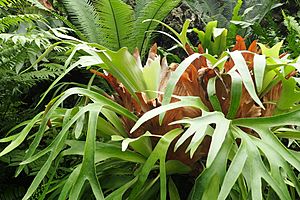Elkhorn fern facts for kids
Quick facts for kids Elkhorn fern |
|
|---|---|
 |
|
| P. bifurcatum | |
| Conservation status | |
|
Least Concern (NCA)
|
|
| Scientific classification |
The elkhorn fern or common staghorn fern (scientific name: Platycerium bifurcatum) is a very interesting type of fern. It grows naturally in places like Java, New Guinea, and eastern Australia. You can find it in states like New South Wales and Queensland, and also on Lord Howe Island.
This fern is special because it's an epiphyte. This means it grows on other plants, like trees, but it doesn't take food from them. It just uses them for support, often in or near rainforests.
About the Elkhorn Fern
The name Platycerium comes from two Greek words: platys, meaning "flat," and ceras, meaning "horn." The second part of its scientific name, bifurcatum, means "forked." Both names describe the fern's unique, horn-like leaves, especially the ones that produce spores.
What It Looks Like
The elkhorn fern can grow quite large, reaching about 90 centimeters (about 3 feet) tall and 80 centimeters (about 2.5 feet) wide. It has two main types of leaves, called fronds:
- Sterile fronds: These are heart-shaped and don't produce spores. They can be 12 to 45 centimeters long. They often grow flat against the tree or surface the fern is attached to.
- Fertile fronds: These are grey-green, arching, and shaped like straps. They are forked, meaning they split into two or more parts, just like an elk's or stag's antlers! These fronds can grow up to 90 centimeters long and are where the fern produces its spores.
Growing Elkhorn Ferns
Because of its unique look, the elkhorn fern is a popular ornamental plant for gardens and homes. If you live in a place with a mild climate, where the temperature doesn't usually drop below 5°C (41°F), you can grow it outdoors in a protected spot. In colder areas, it's often grown indoors as a houseplant.
This fern is so well-loved that it has even won an award! The Royal Horticultural Society gave it their Award of Garden Merit, which means it's a great plant for gardeners to grow.
Images for kids
-
Platycerium bifurcatum from the Mendut Temple, Indonesia
-
Platycerium grande from Bukidnon, Philippines
-
Platycerium elephantotis at Kaisaniemi Botanical Garden, Finland
See also
 In Spanish: Helechos cuerno de ciervo para niños
In Spanish: Helechos cuerno de ciervo para niños






